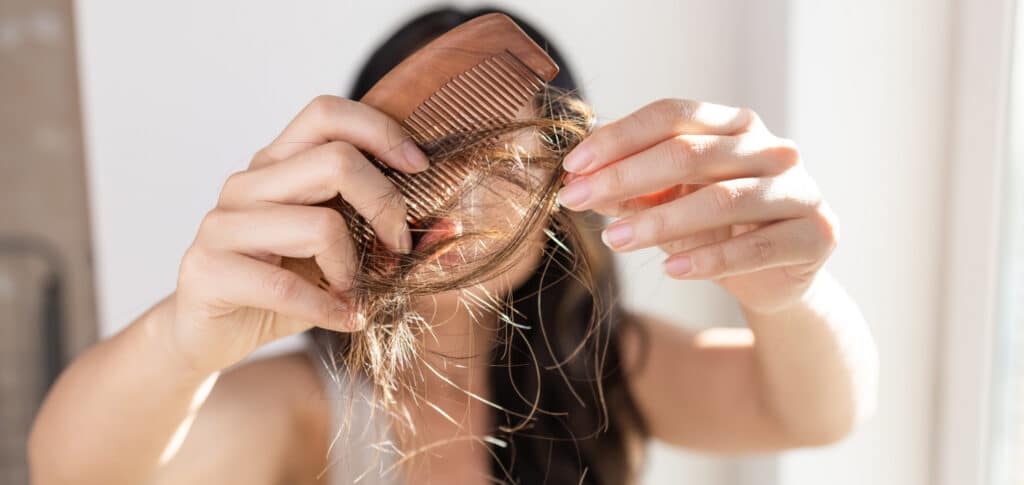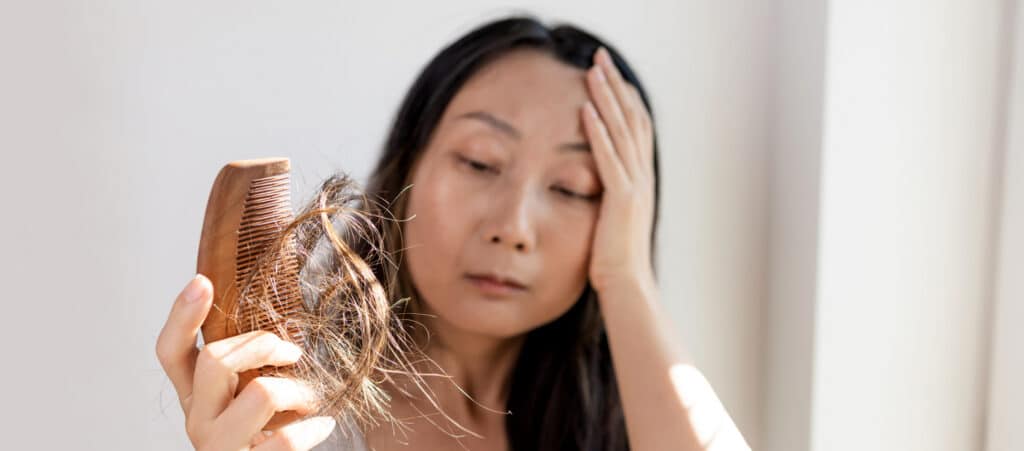If you’re wondering, “Why is my hair falling out?” discovering the reasons for hair falling out in females is essential for finding effective solutions.
Hair loss can be a deeply personal and distressing experience, especially for women who often see their hair as a symbol of their identity and confidence. If you’re wondering, “Why is my hair falling out?” discovering the reasons for hair falling out in females is essential for finding effective solutions.
In this comprehensive guide, we will explore the top factors contributing to hair loss and provide insights on how to address them effectively, with a special focus on Vitamins Revive’s products that support hair growth for women.

Nutritional Deficiencies
A diet lacking in essential nutrients can lead to hair falling out in females. Deficiencies in key nutrients such as iron, zinc, vitamin D, and biotin are known contributors to hair loss. Ensuring a balanced diet rich in these vitamins and minerals is crucial. Additionally, supplements like the Hair Growth Vitamins Kit from Vitamins Revive can help address these deficiencies, promoting healthier hair growth for women.
Essential Nutrients for Hair Growth
|
Nutrient |
Sources |
| Iron | Red meat, spinach, lentils |
| Zinc | Nuts, seeds, dairy |
| Vitamin D | Sunlight, fortified foods, supplements |
| Biotin | Eggs, almonds, sweet potatoes |
Genetic Factors
Genetics play a significant role in hair loss, particularly in female pattern hair loss (androgenetic alopecia). This hereditary condition typically leads to thinning hair, especially around the crown and temples. While genetic hair loss can be challenging to prevent, early intervention with treatments can help slow its progression.
Hormonal Imbalances
Hormonal imbalances represent a major underlying cause of hair loss in females, affecting a significant number of women worldwide. Conditions such as polycystic ovary syndrome (PCOS), menopause, and thyroid disorders are known to exert substantial influence on hair health.
These conditions can disrupt the delicate balance of hormones essential for maintaining the hair growth cycle. For instance, in PCOS, elevated androgen levels can lead to hair thinning and excessive shedding.
Similarly, fluctuations in estrogen and progesterone during menopause can also contribute to hair loss. Thyroid disorders, whether hyperthyroidism or hypothyroidism, can disrupt metabolism and impact hair growth patterns.
Recognizing the signs of hormonal imbalance is crucial; symptoms may include sudden hair thinning, increased shedding, and changes in hair texture. Consulting with a healthcare provider is vital for an accurate diagnosis through hormonal testing and to discuss appropriate treatment options tailored to individual needs. Addressing the root cause of hormonal imbalance not only helps in managing hair loss but also promotes overall health and well-being.
Aging
As women age, natural changes in the body can lead to hair thinning and loss. The hair growth cycle slows down, and hair follicles may shrink, producing finer and fewer hairs. While aging is inevitable, maintaining a healthy lifestyle and using products designed for aging hair can help mitigate its effects.
Hair Care Practices
Certain hair care practices can cause hair falling out in females. Frequent use of heat styling tools, chemical treatments, and tight hairstyles can damage the hair shaft, leading to breakage and hair loss. Opting for gentler hair care routines, reducing the use of harsh treatments, and using protective hairstyles can help maintain hair health.
Medical Conditions
Various medical conditions can cause hair falling out in females. Autoimmune diseases like alopecia areata, scalp infections, and chronic illnesses can all contribute to hair loss. If you suspect a medical condition is affecting your hair, it’s essential to seek medical advice for appropriate diagnosis and treatment.
Pregnancy and Postpartum Changes
Significant hormonal changes during pregnancy and postpartum periods can cause hair falling out in females. Many women experience hair shedding after giving birth, known as postpartum alopecia. This condition is usually temporary, with hair growth typically resuming within a few months.
Medication Side Effects
Certain medications can have side effects that include hair loss. Chemotherapy drugs, blood thinners, and some antidepressants are known to cause hair falling out in females. If you believe your medication is contributing to hair loss, consult your doctor to discuss potential alternatives or solutions.
Stress and Anxiety
Chronic stress and anxiety are major reasons for hair falling out in females. Stress can trigger a condition called telogen effluvium, where hair prematurely enters the resting phase of the hair growth cycle, resulting in excessive shedding. Common stressors include work pressures, financial worries, relationship issues, and balancing family responsibilities. Incorporating stress management techniques such as meditation, yoga, regular exercise, and ensuring adequate sleep can help mitigate this effect.

Tips for Managing Hair Loss
- Maintain a Balanced Diet:
- Eating a diet rich in vitamins and minerals is crucial for hair health. Include foods high in iron, zinc, and biotin to promote hair growth and prevent deficiencies that cause hair falling out in females.
- Manage Stress Effectively:
- Chronic stress can lead to hair shedding. Engage in stress-reducing activities such as yoga, meditation, or regular exercise to maintain a healthy mind and body.
- Avoid Harsh Hair Treatments:
- Frequent use of heat styling tools, chemical treatments, and tight hairstyles can damage hair and lead to breakage. Opt for less damaging styles and treatments to protect your hair.
- Use Gentle Hair Care Products:
- Choose shampoos and conditioners that are free from harsh chemicals and sulfates. Gentle products can maintain scalp health and prevent irritation that could contribute to hair loss.
- Seek Medical Advice for Underlying Conditions:
- If you suspect an underlying medical condition is causing your hair loss, consult a healthcare professional. Conditions like thyroid disorders, PCOS, or scalp infections require medical treatment to manage hair loss effectively.
Poor Scalp Health
A healthy scalp is essential for healthy hair growth. Conditions like dandruff, psoriasis, and excessive oiliness can cause hair falling out in females by clogging hair follicles and impeding growth. Regular scalp care, including exfoliation and the use of medicated shampoos, can improve scalp health and promote hair growth.
In conclusion, understanding the reasons for hair falling out in females is the first step towards effective prevention and treatment. By addressing these factors and adopting a holistic approach, including the use of products like the Hair Growth Vitamins Kit from Vitamins Revive, you can enhance hair health and reduce hair loss. Remember, you are not alone in this journey. With the right knowledge and tools, you can take control of your hair health and achieve the luscious locks you desire. Contact us now >>>

